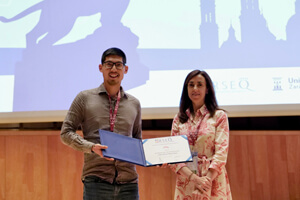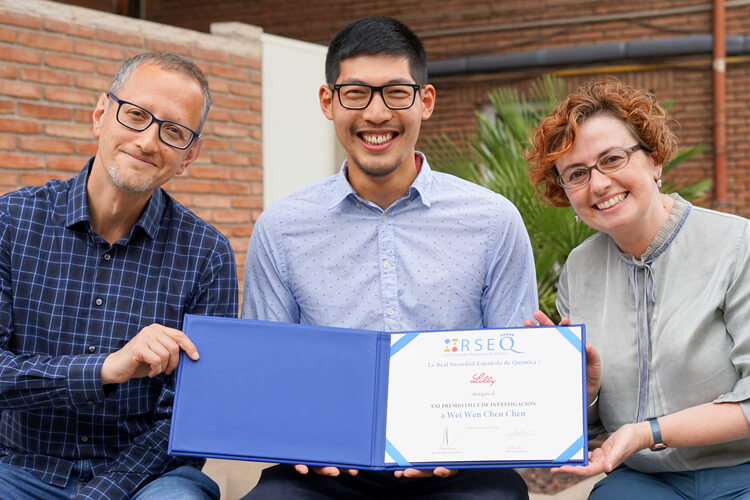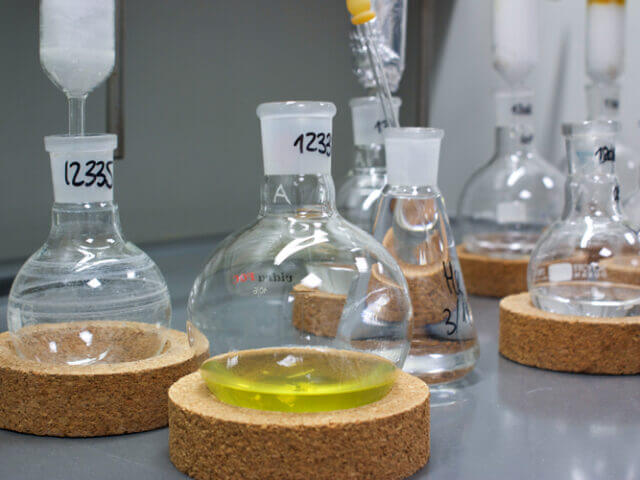IQS Researcher Wei W. Chen Honoured by RSEQ and Lilly
Wei Wen Chen, a PhD student at IQS and the Institute of Advanced Chemistry of Catalonia IQAC-CSIC, received one of the three awards at the 21st edition of the Research Awards for Doctoral Students, organized by the Royal Spanish Society of Chemistry (RSEQ) and the pharmaceutical company Lilly España. Held annually, these awards recognize the achievements of students who are doing their doctoral thesis in the areas of Organic, Pharmaceutical, or Analytical Chemistry and are members of the RSEQ. The award entails 2,000 euros in financial support.
As was the case of the other two winners, Wei Wen Chen’s doctoral thesis is focused on the development of advanced synthetic methodology tools, seeking to make drug synthesis processes more sustainable. His thesis, jointly supervised by Dr Ana Belén Cuenca, professor with the Department of Organic Chemistry and Pharmacy at IQS, and Dr Alexander Shafir, researcher at IQAC – CSIC, addresses the great synthetic versatility presented by a series of halogenated derivatives in a hypervalent state when they are put in contact with nucleophilic species of silicon and/or boron, all aimed at developing new reactions of C-H functionalization of arenes that generate especially versatile complex molecular architectures.
Wei W. Chen’s thesis forms part of the BiSiBonds project, which is being jointly carried out by Dr Cuenca and Dr Shafir within the IQS – CRISOL Group and IQAC-CSIC.
We interviewed Wei W. Chen and his thesis supervisors on the occasion of Chen earning this award.
Wei, what has receiving this award meant to you?
Wei. This award and honour has many implications, both personally and professionally. On the one hand, it provides greater visibility and support for the work we do, both my colleagues and myself, in the area of synthetic methodology. On the other hand, it highlights the great importance of basic research not only in the academic context, but also in the industrial environment.“
“This award provides great support to the work our group does in the area of synthetic methodology”
”
At the same time, it has a huge impact on my own scientific career and it has provided me with an important dose of motivation to go further down this path of research. I’m extremely content!
Your thesis is focused on the area of synthetic methodology. Could you briefly explain your objective?
Wei. To simplify and summarize, my research is based on the development of synthetic tools to explore new transformations and modify, through hypervalent halogen species, chemical bonds such as carbon-hydrogen bonds, which are very difficult to modify using “classical” methodologies that require “forced” reaction conditions, using transition metals which are in many cases accompanied by low levels of selectivity since the C-H bond is the most abundant in organic molecules. Instead, our proposal allows us to search for new coupling strategies efficiently, selectively, and under mild conditions.
In the specific case of my thesis, we have developed methodologies to be able to modify different C-H positions of an aromatic ring selectively through the use of hypervalent iodine, a very versatile halogen in synthetic chemistry, managing to selectively incorporate functionalizations of great interest.

Wei. As I already mentioned, these prizes, which coincide in the area of synthetic methodology, highlight the importance of basic research both in the academic context and in the industrial world. The other two young winners are also conducting research in this area, carrying out transformations through transition metal catalysis, which is also highly valued today in the pharmaceutical industry, and photochemical catalysis, also very interesting for activating bonds through the use of light. The pharmaceutical sector sees great opportunities in all of this, and it is very important for this type of research to be recognized.
Having a transformation like the one we are proposing, which involves the introduction of a halogen, without transition metals and with great selectivity, which does not need prior activation, is a very powerful synthesis tool.“
“A highly selective transformation like the one we are proposing is a very powerful synthesis tool”
”
Dr Cuenca. Pharmaceutical companies know that they need more methodological tools to prepare drugs, that they do not have enough with what they have available, and they are increasingly seeking for the transformation of a drug, of an API, to be more specific and take place in milder and more sustainable conditions. They value our proposal to “build the links in a more efficient way,” always considering future scaling for the process with aspects such as saving purification stages, more versatile and environmentally friendly processes, and so on.
The selectivity of our method is very important and the ability to create a new bond from a C-H bond (one of the most inert bonds that exists in organic chemistry) is extremely interesting. The possibility of introducing a substituent, without the need for prior activation of the substrate, entails reducing synthesis steps and, consequently, overall process costs.
“The possibility of introducing a substituent, without the need for prior activation of the substrate, entails reducing synthesis steps and, consequently, overall process costsl”
Dr Shafir. I would add that, in addition to the issue of scaling, the fact of being able to generate many structures with this methodology has immense value since one of the greatest costs in developing a drug involves being able to find the molecule that has activity among many compounds. Our methodology makes it possible to quickly generate a family of structures with great molecular complexity (from the point of view of versatility) and easily have compound libraries. With small modifications of the nucleophile, different selectivities can be achieved at the desired positions with high versatility. In short, we can achieve “complexity” (access to many different compounds) in a clean (without having mixtures in each transformation) and very effective manner.
“Our methodology makes it possible to quickly generate great molecular complexity and easily have compound libraries in a very effective manner
Dr Cuenca. The fact that a company like Lilly recognizes and values the bridges that exist between the basic development that is carried out academically and industrial implementation is very important. And it has been recognized! Lilly has decided to make research and efforts visible and reward them!
Wei, isn’t this the second prize you’ve earned in this innovative area of research?
Wei. Yes. With my Master Thesis “Iodine-directed allylation reaction of aromatic carbon-hydrogen bonds,” I earned an Archimedes Award in 2019 for the best research work in the area of Chemistry in Spain.
Finally, a question for your supervisors. What does it mean to work with someone with the stature of Wei Wen Chen? Has he been an essential link in building your group?
Dr Shafir. It’s immensely satisfying! Wei and Raúl are the first PhD students in our BiSiBonds project, which was created in 2017 as the result of the collaboration between IQS and IQAC. Both graduated from the IQS-URL Master’s Degree in Pharmaceutical Chemistry, which also reflects its outstanding quality. And we thank them very much for their work as “initiators” of this line of research. They have worked really hard and well! And they have helped us firmly establish this platform, which we hope will be very successful.
Dr Cuenca. It is a real luxury to have a student like Wei who is genuinely interested in chemistry and the chemical processes he is addressing. In addition, where appropriate, this interest is combined with incredible “manual” skills, because these hypervalent iodine species tend to shrink rapidly and it isn’t always easy to learn how to handle them. It’s almost like being a magician at times!
In my opinion, it is important to highlight again the fact that Wei graduated from the IQS Master’s Degree in Pharmaceutical Chemistry. The fact that this research was honoured both by the RSEQ and by a large pharmaceutical company is also a success and a validation of the master’s programmes we offer. I would like to conclude by thanking IQS and IQAC for their institutional support of our platform, in addition to the award received from RSEQ and Lilly.
“The fact that this research was honoured is also a success and a validation of our Master’s Degree in Pharmaceutical Chemistry
RELATED PEOPLE:
RESEARCH GROUP
Chemical Reactions for Innovative Solutions
RELATED PROJECTS
BISi-Bonds (Nuevos métodos y moléculas para un futuro mejor)








